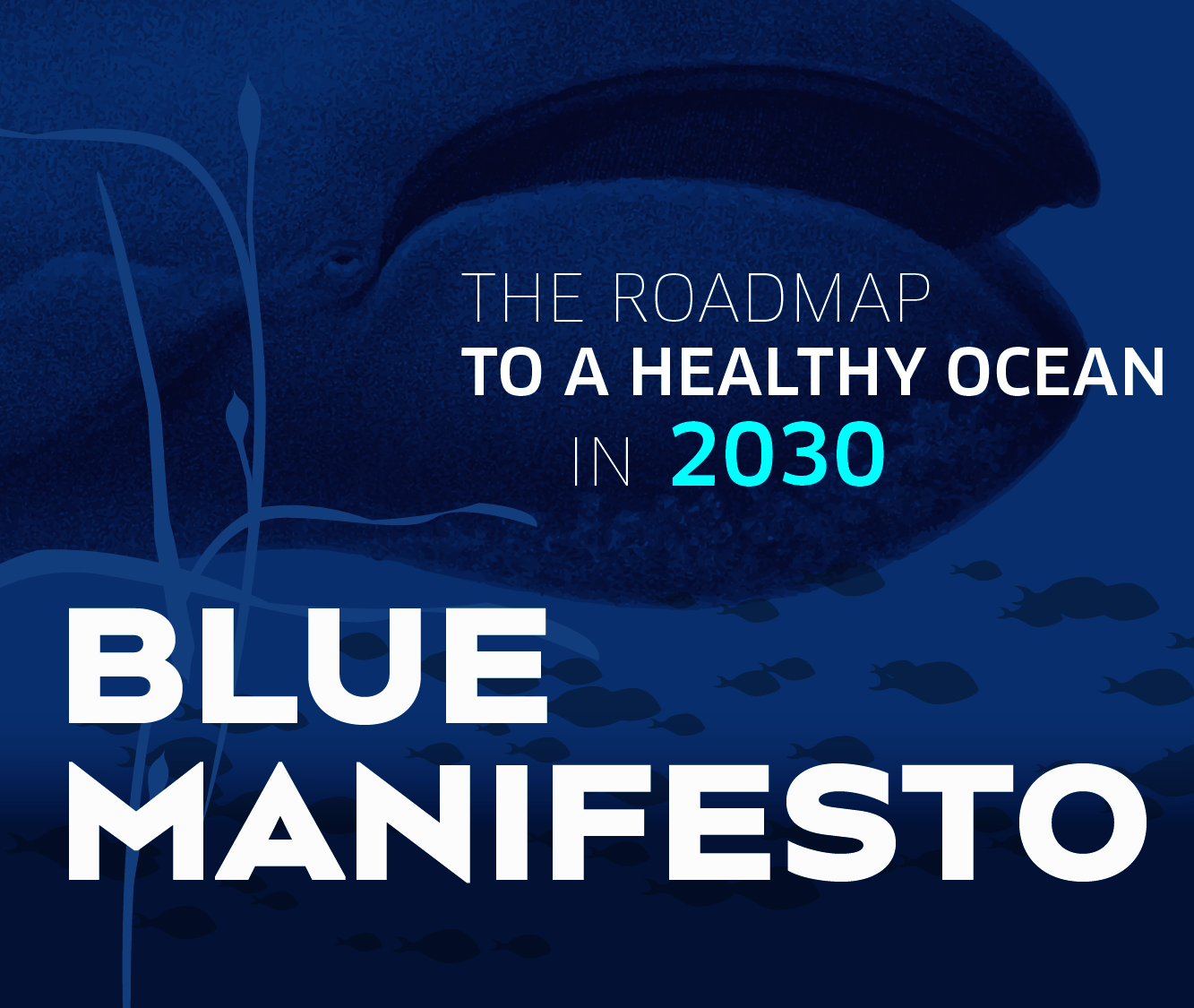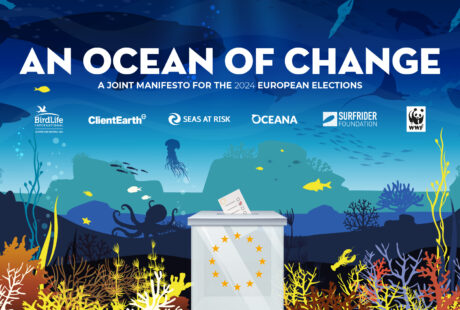Environmental NGOs launch new rescue plan for Europe to make our ocean healthy by 2030 – Today, 102 environmental organisations (1), led by Seas At Risk, BirdLife Europe, ClientEarth, Oceana, Surfrider Foundation Europe and WWF are launching the “Blue Manifesto” (2). The rescue plan lays out concrete actions which must be delivered by set dates in order to turn the tide on the ever-degraded and polluted ocean and coastlines.
To be successful, change is needed on both land and sea. The NGOs call for:
- At least 30% of the ocean to be highly or fully protected by 2030
- Shift to low-impact fishing
- Securing a pollution-free ocean
- Planning of human activities that support the restoration of thriving marine ecosystems
The situation in marine ecosystems around the world is dire, as stressed by recent reports released by the UN Intergovernmental Panel on Climate Change and by the UN Intergovernmental Science-Policy Platform on Biodiversity and Ecosystem Services (3). Urgent action is needed and Europe can play a leading role in facing this challenge. Heeding the recommendations presented in the Blue Manifesto will put Europe on the right track to protect and restore the ocean, which is under increasing threat and on which life on Earth depends (4). With the European Green Deal (5), the European Commission has committed to implement real climate and biodiversity strategies that will shift investment and legislation towards a climate-resilient and ecologically diverse future. NGOs now call on the European Commission to ensure the ocean is an integral part of these strategies by following the guidelines proposed in the Blue Manifesto.

Monica Verbeek, Executive Director at Seas At Risk said: “The ocean covers 70% of the Earth’s surface, mitigates climate change and provides oxygen – it is the planet’s support system. To perform its vital functions the ocean needs to be healthy and populated with life. We call on the political leaders of the EU to bring the ocean at the core of the political agenda and make a healthy ocean a reality. The joint Blue Manifesto launched today is the Blue answer to the European Green Deal.”
Bruna Campos, Senior Marine Policy Officer, BirdLife Europe & Central Asia said: “Saving the oceans means saving both marine species and their habitats. It is about actively restoring our seabeds and halting ongoing destructive fishing. It is incomprehensible how fishing vessels are still allowed to bycatch dolphins, seabirds and sea turtles. We need a transformative change to save our oceans in the next ten years. Nature at sea is in crisis because we lack commitment to change the status quo, and we can no longer afford it. ”
Flaminia Tacconi, EU fisheries lawyer of ClientEarth said: “Sustainable fisheries law with ambitious environmental objectives will need to be implemented and enforced to have healthy oceans by 2030. We also need to promote a strong culture of compliance through transparent, reliable and accountable decisions in the EU.”
Pascale Moehrle, Executive Director of Oceana Europe said: “The EU has more water than land surface and, as a world economic power, should lead by example. EU seas are extensively used and need to be restored to their former abundant state rather soon. The EU must urgently act to ensure that all fishing is sustainable. It is in the hands of EU decision-makers to take action. Vibrant oceans mean healthier global ecosystems.”
Antidia Citores, Spokesperson for Surfrider Foundation Europe said: “Human activities on land and at sea are severely impacting the ocean. They are affecting all waters through visible and invisible pollution resulting from plastics, contaminants, chemicals but also oil leaks and noise. They are impacting the resilience of the ocean and the health and well-being of millions of citizens. The EU must deliver with concrete measures for a clean, healthy and pollution-free ocean”.
Samantha Burgess, Head of Marine Policy at WWF European Policy Office said: “Urgent action must be taken to ensure the resilience of our ocean in the face of the climate emergency, beginning with the restoration of marine biodiversity. A network of Marine Protected Areas covering at least 30% of the ocean with long term budgets and management plans, alongside planned and sustainable management for the remaining 70%, will support thriving marine ecosystems. The EU must ensure effective policy implementation to deliver this vision.”
Leading environmental NGOs invite citizens, institutions and stakeholders to participate in the free activities organised during “Ocean Week” from February 3 to 9, 2020 (6), to exchange experiences and solutions on the challenges life in our ocean and coastal communities are facing.
ENDS
CONTACT
Louisa Gray, Member Liaison Officer, lgray [at] seas-at-risk.org
Notes
(1)
List of organisations which signed the Blue Manifesto: A Rocha (International Marine and Coastal Conservation Programme); Animal latitude; APECE – Portuguese Association for the Study and Conservation of Elasmobranchs; Archipelagos Institute of Marine Conservation; ASOC – Antarctic and Southern Ocean Coalition; Asociacion plataforma”El Chorlitejo”; BIOM association; BirdLfie Sverige; BirdLife Cyprus; Birdlife Europe and Central Asia; BirdLife Malta; BirdLife Suomi; Birdwatch Ireland; Bloom; Brot für die Welt; BUND – Bund für Umwelt und Naturschutz Deutschland; By the Ocean We Unite; Climate Action Network Europe; CCB – Coalition Clean Baltic; CFFA-CAPE; ClientEarth; Compassion in World Farming; Cork Env Forum; Cork nature network; Deep Sea Conservation Coalition; Deep wave; DEPANA; DN – Danmarks Naturfredningsforening; DSM – Deutsche Stiftung Meeresschutz; ; DUH – Deutsche Umwelthilfe; Ecologistas En Accion; Ecos; EEB – European Environmental Bureau; ENT Foundation; Environmental Justice Foundation; FANC – Finnish Association for Nature Conservation; France Nature Environnement; Friends of the Black Sea; Friends of the Earth Europe; Fundajia Aquarium; Geota; Good fish foundation; Greenpeace; HOS – Hellenic Ornithological Society; IFAW – International Fund for Animal Welfare Europe; INCA – Iceland Nature Conservation Association; International Programme on the State of the Ocean; Irish Sea Sanctuary; Irish Wildlife Trust; Legambiante; Living Sea; LOB – Latvian Ornithological Society; LOD – Lithuanian Ornithological Society; LPN – Liga para a Protecção da Natureza; LPO – Ligue pour la Protection des Oiseaux; MARE Foundation; Mare Nostrum; Marevivo; MCS – Marine Conservation Society; MedReact; MedSOS; MEER; MIO-ECSDE – Mediterranean Information Office for Environment, Culture and Sustainable Development; Mundus Maris; NABU – Nature and Biodiversity Conservation Union; Natuurpunt; New Economics Foundation; Ocean and Climate Platform; Oceana; OceanCare; Oceanografica; OMA – Observatório do Mar dos Açores; Otop – Ogólnopolskie Towarzystwo Ochrony Ptaków; Our Fish; PongPesca; Poseidonia green project; Project Aware; Prowildlife; Quercus; ReefCheck; Rethink Plastic Alliance; Retorna; RSPB – Royal Society for the Protection of Birds; SAR – Seas At Risk; Sciaena; SDN – Stichting de Nordzee; Sea First; SEO – Sociedad Española de Ornitología; Slow Food Germany; SMILO – Small Islands Organisation; SPEA – Sociedade Portuguesa para o Estudo das Aves; SSNC – Swedish Society for Nature Conservation; Sunce; Surfrider; SWAN – Sustainable Water Network; T&E – Transport and Environment; TNC – The Nature Conservancy; Tour des deux Amériques solidaire en voilier; Under the pole; WDC – Whale and Dolphin Conservation; WWF; Zero Waste Europe.
(2)
The Blue Manifesto is available at: https://seas-at-risk.org/24-publications/1020-blue-manifesto-the-roadmap-to-a-healthy-ocean-in-2030.html
Press Release available in EN, FR, ES, IT, PT, DE, HR, BG.
(3)
The Special Report on the Ocean and Cryosphere in a Changing Climate published by the UN Intergovernmental Panel on Climate Change analyses the increasing impact of climate change on the Ocean and its grim consequences. https://www.ipcc.ch/2019/09/23/b-roll-ipcc-srocc/
The Global Assessment Report on Biodiversity and Ecosystem Services published by the UN Intergovernmental Science-Policy Platform on Biodiversity and Ecosystem Services shows that global biodiversity loss is increasing at an alarming pace, stressing Nature’s dangerous decline and accelerated species extinction rates. https://ipbes.net/news/Media-Release-Global-Assessment
(4)
The ocean covers 70% of the world’s surface, acts as a vital carbon sink, mitigates climate change, regulates the weather patterns and produces oxygen.
(5)
The European Green Deal is the European Commission’s vision to make Europe climate-neutral by 2050. It provides actions to boost the efficient use of resources by moving to a clean, circular economy and stop climate change, halt biodiversity loss and cut pollution. It outlines investments needed and financing tools available and explains how to ensure a just and inclusive transition.
(6)
From 3 to 9 February 2020, a group of environmental NGOs will launch “Ocean Week”. During this week, a series of events will debate, exchange experiences and solutions on the challenges the ocean is facing. The Ocean Week programme is available at www.oceanweek.eu
—
Seas At Risk is an umbrella organisation of environmental NGOs from across Europe that promotes ambitious policies at European and international level for the protection and restoration of the marine environment.
BirdLife Europe and Central Asia is a partnership of 48 national conservation organisations and a leader in bird conservation. Our unique local to global approach enables us to deliver high impact and long term conservation for the benefit of nature and people. BirdLife Europe and Central Asia is one of the six regional secretariats that compose BirdLife International. Based in Brussels, it supports the European and Central Asian Partnership and is present in 47 countries including all EU Member States. With more than 4100 staff in Europe, two million members and tens of thousands of skilled volunteers, BirdLife Europe and Central Asia, together with its national partners, owns or manages more than 6000 nature sites totalling 320,000 hectares.
Client Earth is a charity that uses the power of the law to protect people and the planet. We are international lawyers finding practical solutions for the world’s biggest environmental challenges. We are fighting climate change, protecting oceans and wildlife, making forest governance stronger, greening energy, making business more responsible and pushing for government transparency. We believe the law is a tool for positive change. From our offices in London, Brussels, Warsaw, Berlin, Madrid and Beijing, we work on laws throughout their lifetime, from the earliest stages to implementation. And when those laws are broken, we go to court to enforce them. www.clientearth.org
Oceana is the largest international advocacy organization dedicated solely to ocean conservation. Oceana is rebuilding abundant and biodiverse oceans by winning science-based policies in countries that control one third of the world’s wild fish catch. With over 200 victories that stop overfishing, habitat destruction, pollution and killing of threatened species like turtles and sharks, Oceana’s campaigns are delivering results. A restored ocean means that one billion people can enjoy a healthy seafood meal, every day, forever. Together, we can save the oceans and help feed the world. Visit www.eu.oceana.org to learn more.
Surfrider Foundation Europe is a non-profit organisation whose purpose is to protect the ocean, the coastline, all aquatic environments and their users. Surfrider Europe was created in 1990 by a group of surfers who wanted to preserve their playground. Grass-roots activism to protect the ocean and coasts is at the core of the organisation. It currently has over 13,000 members and is active across 12 countries through its 46 volunteer-run branches. For 30 years, Surfrider Foundation Europe has developed impactful programmes in three areas: marine litter, water quality and public health, coastal management and climate change. Visit our website: www.surfrider.eu
WWF is an independent conservation organisation, with over 30 million followers and a global network active in nearly 100 countries. WWF’s mission is to stop the degradation of the Earth’s natural environment and to build a future in which humans live in harmony with nature, by conserving the world’s biological diversity, ensuring that the use of renewable natural resources is sustainable, and promoting the reduction of pollution and wasteful consumption. The WWF European Policy Office contributes to the achievement of WWF’s global mission by leading the WWF network to shape EU policies impacting the European and global environment.
Posted on: 27 January 2020


